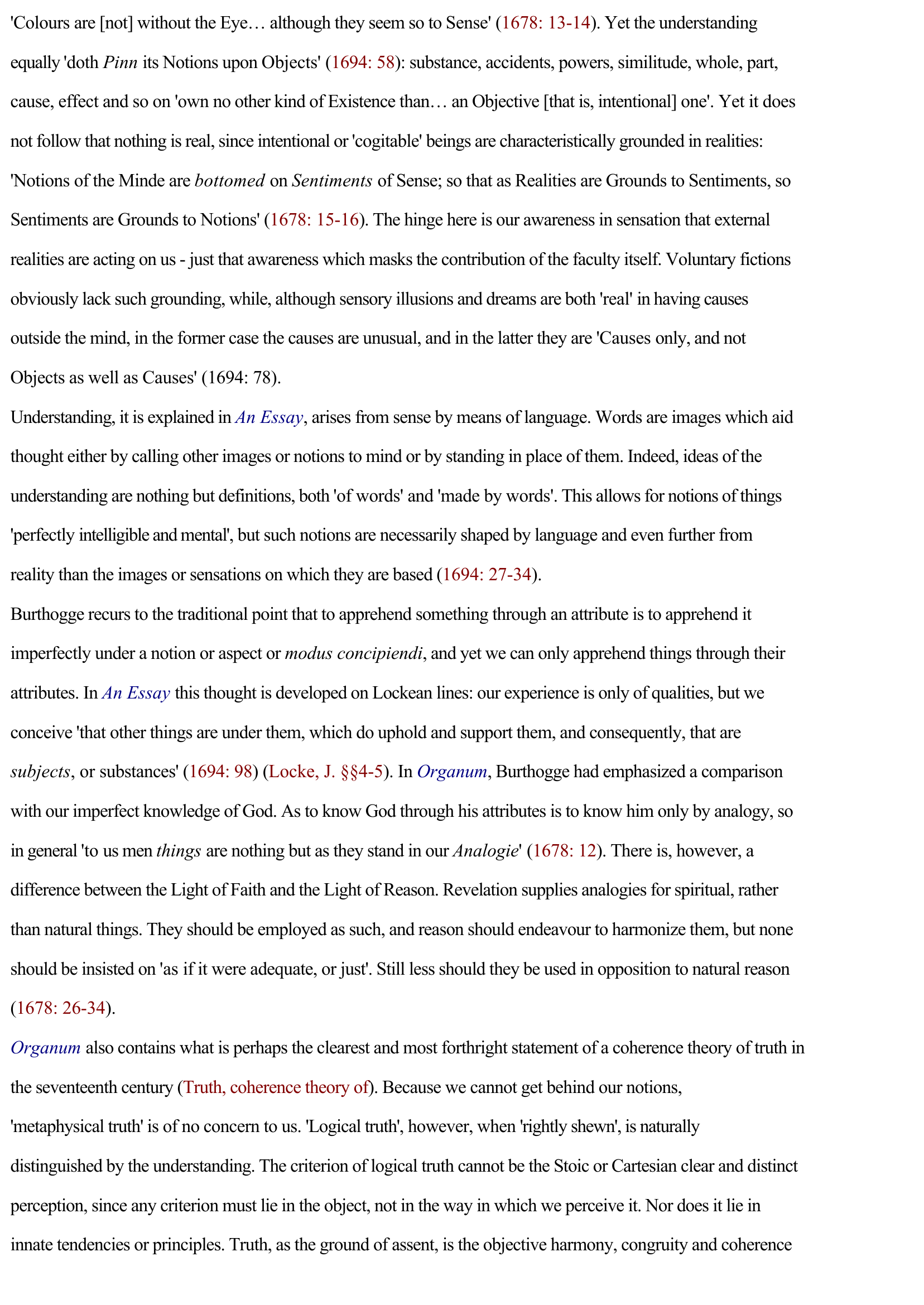Burthogge, Richard
Publié le 22/02/2012

Extrait du document
«
'Colours are [not] without the Eye… although they seem so to Sense' (1678: 13-14 ).
Yet the understanding
equally 'doth Pinn its Notions upon Objects' (1694: 58 ): substance, accidents, powers, similitude, whole, part,
cause, effect and so on 'own no other kind of Existence than… an Objective [that is, intentional] one' .
Yet it does
not follow that nothing is real, since intentional or 'cogitable' beings are characteristically grounded in realities:
'Notions of the Minde are bottomed on Sentiments of Sense; so that as Realities are Grounds to Sentiments, so
Sentiments are Grounds to Notions' (1678: 15-16 ).
The hinge here is our awareness in sensation that external
realities are acting on us - just that awareness which masks the contribution of the faculty itself.
Voluntary fictions
obviously lack such grounding, while, although sensory illusions and dreams are both 'real' in having causes
outside the mind, in the former case the causes are unusual, and in the latter they are 'Causes only, and not
Objects as well as Causes' (1694: 78).
Understanding, it is explained in An Essay , arises from sense by means of language.
Words are images which aid
thought either by calling other images or notions to mind or by standing in place of them.
Indeed, ideas of the
understanding are nothing but definitions, both 'of words' and 'made by words' .
This allows for notions of things
'perfectly intelligible and mental' , but such notions are necessarily shaped by language and even further from
reality than the images or sensations on which they are based ( 1694: 27-34 ).
Burthogge recurs to the traditional point that to apprehend something through an attribute is to apprehend it
imperfectly under a notion or aspect or modus concipiendi , and yet we can only apprehend things through their
attributes.
In An Essay this thought is developed on Lockean lines: our experience is only of qualities, but we
conceive 'that other things are under them, which do uphold and support them, and consequently, that are
subjects , or substances' (1694: 98 ) (Locke, J.
§§4-5 ).
In Organum , Burthogge had emphasized a comparison
with our imperfect knowledge of God.
As to know God through his attributes is to know him only by analogy, so
in general 'to us men things are nothing but as they stand in our Analogie ' (1678: 12 ).
There is, however, a
difference between the Light of Faith and the Light of Reason.
Revelation supplies analogies for spiritual, rather
than natural things.
They should be employed as such, and reason should endeavour to harmonize them, but none
should be insisted on 'as if it were adequate, or just' .
Still less should they be used in opposition to natural reason
(1678: 26-34 ).
Organum also contains what is perhaps the clearest and most forthright statement of a coherence theory of truth in
the seventeenth century ( Truth, coherence theory of ).
Because we cannot get behind our notions,
'metaphysical truth' is of no concern to us.
'Logical truth' , however, when 'rightly shewn' , is naturally
distinguished by the understanding.
The criterion of logical truth cannot be the Stoic or Cartesian clear and distinct
perception, since any criterion must lie in the object, not in the way in which we perceive it.
Nor does it lie in
innate tendencies or principles.
Truth, as the ground of assent, is the objective harmony, congruity and coherence.
»
↓↓↓ APERÇU DU DOCUMENT ↓↓↓
Liens utiles
- Compte-rendu critique 5 « La transformation des modèles d’organisation et de démocratie dans les partis. L’émergence du parti-cartel », Richard Katz
- En quoi Richard Wagner, l’homme et ses œuvres musicales, sont-elles non seulement un outil de propagande, mais également une esthétisation de la politique et de l’idéologie nazie ?
- En quoi Richard Wagner, l’homme et ses œuvres musicales, sont-elles non seulement un outil de propagande, mais également une esthétisation de la politique et de l’idéologie nazie ?
- Le personnage de RICHARD III
- AMANTS RÉSERVÉS (Les) (résumé & analyse) de Sir Richard Steele

































